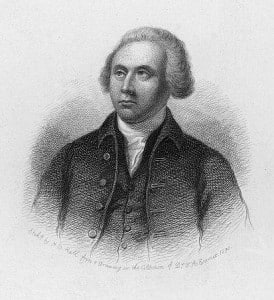Thomas Nelson, Jr. (December 26, 1738 – January 4, 1789) was a wealthy plantation owner from the infamous town of Yorktown, Virginia. He was elected to represent Virginia as a delegate at the Second Continental Congress and would serve as the Governor of Virginia in 1781.
He signed the Declaration of Independence alongside fellow Virginia delegates: Thomas Jefferson, George Wythe, Francis Lightfoot Lee, Richard Henry Lee, Carter Braxton, and Benjamin Harrison. Nelson also served as a soldier during the American Revolutionary War.

Thomas Nelson Jr. was the grandson of an early pioneer who settled in Yorktown. He was born into an influential family. His father, William Nelson, and mother, Elizabeth Burwell, were leading citizens of Yorktown. His father, William, was the leader of the colony of Yorktown and served as Virginia's governor for a short time.
Thomas was born into a life of great wealth and advantage, but his work ethic would not be influenced by the luxuries that he inherited. He studied hard and was educated in the motherland of England. There, he attended Eton and then went on to Cambridge. He returned home to continue to help his father run a large and wealthy plantation.
Thomas began to explore politics in 1761 and was elected to the Virginia House of Burgesses. By the time the American Revolutionary War was beginning, Nelson was elected to the Continental Congress, where he would serve until 1781. He would sign the Declaration of Independence, and he was influential in the drafting of Virginia's Constitution.
Nelson was an active soldier during the American Revolutionary War. He served as the commanding General of the Lower Virginia militia. He participated during the siege of Yorktown and told George Washington to fire on his own home where Cornwallis was based.
Death and Remembrance
He died at his son's home in Hanover County, Virginia, and is buried in the Grace Churchyard at Yorktown. Charles Goodrich had this to say about Thomas Nelson in his biography of the Lives of the Signers of the Declaration of Independence:
His death occurred on the 4th of January, 1789, just after he had completed his fiftieth year. Few patriots of the revolution have descended to the grave more justly honoured and beloved. Few possessed a more ample fortune; few contributed more liberally to support the cause of liberty. It was the patriotism, the firmness, the generosity, the magnanimous sacrifices of such men that conducted the colonies through a gloomy contest of seven years of continuance and gave them a rank among the independent nations of the earth.

